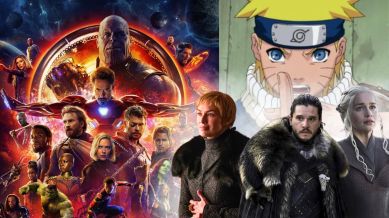Too much, too fast: Is pop culture oversaturated?
We are cultivating systems that reward repetition. In that model, new voices, especially those without marketing budgets or studio machines, get drowned out.

At some point in the last five years, it became almost impossible to keep up not just with movies or shows, but with everything. A new album would trend overnight. A YouTube series would go viral. Another streaming original would suddenly be called “essential viewing.”
What changed wasn’t just the volume. It was how fast something could go from being a discovery to becoming unavoidable. A niche fandom becomes a global franchise within weeks. An underground artist lands a brand deal before their second release. You are either right on top of the wave or five scrolls too late.
monthly limit of free stories.
with an Express account.
This is what saturation looks like in 2025: not just too much content, but too much urgency around it.
Pop culture is everywhere, but intimacy is gone
Fandom used to be a signal. You found something, chose it, and built a relationship with it. You went to screenings, read interviews, and collected the merch. It became a part of your personality — something you found before the world caught on.
Today, fandom is often the product itself. Every piece of content arrives pre-loaded with a hashtag, a reaction template, and a fandom starter pack.
Take anime; once a niche subculture, now fully mainstream. Not because the content changed, but because the masses caught up. Being a “geek” is now a marketable demographic, not a personality. And while that cultural validation is great, something’s been lost along the way.
Fandom used to grow from the inside out. Now, everything goes wide before it gets a chance to go deep. For independent creators, this hyper-speed attention cycle makes it nearly impossible to build something slow, lasting, and meaningful.
The cost of constant choice
Streaming platforms changed how we consume stories and how quickly. First came binge-watching. Then, episodic returns. Then, cinematic universes. Simultaneous drops across languages and regions.
But more content didn’t mean more freedom. It meant paralysis.
You spend more time choosing than watching. You start shows because they are trending and never finish them. You miss original, strange, beautiful work because the algorithm keeps looping you through what it thinks you like.
If you finished Game of Thrones, you were nudged into House of the Dragon. If you liked Breaking Bad, here’s Better Call Saul. It’s like being trapped in autoplay, where you don’t choose what to watch, just what’s next.
We are cultivating systems that reward repetition. In that model, new voices, especially those without marketing budgets or studio machines, get drowned out.
Is this still enjoyable?
There’s a creeping fatigue even among the most loyal fans. What used to be passion now feels like homework.
You are expected to catch the finale before everyone else on your feed. You are supposed to feel deeply and also move on quickly. The Marvel Cinematic Universe requires spreadsheets to follow. And God forbid, you miss a post-credit scene… someone will explain why that ruins everything.
In all that noise, a lot gets missed.
Some of the most original, moving Indian work, comics, zines, indie films, and experimental animation get buried under content that’s just louder, cleaner, and better promoted. That’s not a criticism of scale. It’s just a reminder that creative ecosystems thrive on range, not just reach.
What now?
This isn’t a call for less content. But maybe… fewer expectations from it.
Less pressure to keep up. Fewer declarations that something will “change your life.” More space for slow fandoms. For creators who build worlds over time and not overnight.
We talk a lot about virality. Maybe it’s time we talk about longevity, too.
The stories that stay with us rarely arrive with a marketing plan. They find us quietly when we’re not looking for them.
The writer is the Founder of Comic Con India